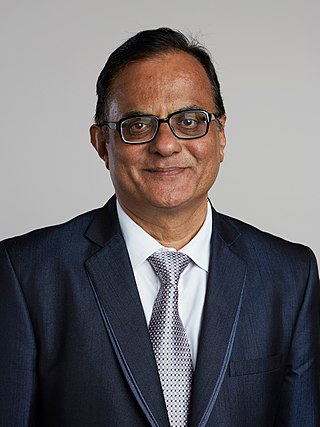
The Indian Institute of Science (IISc) is a public, deemed, research university for higher education and research in science, engineering, design, and management. It is located in Bengaluru, Karnataka. The institute was established in 1909 with active support from Jamsetji Tata and thus is also locally known as the Tata Institute. It was granted a deemed university status in 1958 and recognized as an Institute of Eminence in 2018.

Chintamani Nagesa Ramachandra Rao,, is an Indian chemist who has worked mainly in solid-state and structural chemistry. He has honorary doctorates from 86 universities from around the world and has authored around 1,800 research publications and 58 books. He is described as a scientist who had won all possible awards in his field except the Nobel Prize.
Padmanabhan Balaram is an Indian biochemist and a former director of the Indian Institute of Science in Bangalore, India. He is a recipient of the third highest Indian civilian honour of Padma Bhushan (2014) as well as the TWAS Prize (1994). He has been conferred the 2021 R. Bruce Merrifield Award by the American Peptide Society.

The Centre for Development of Advanced Computing (C-DAC) is an Indian autonomous scientific society, operating under the Ministry of Electronics and Information Technology.

Vettaiyaadu Vilaiyaadu is a 2006 Indian Tamil-language neo-noir action thriller film written and directed by Gautham Vasudev Menon. The film stars Kamal Haasan and Jyothika, while Kamalinee Mukherjee, Prakash Raj, Daniel Balaji, and Salim Baig play supporting roles. It revolves around DCP Raghavan, who tries to track down two serial killers Amudhan and Illamaran.

Anurag Kumar was the Director of the Indian Institute of Science at Bangalore, India from 2014–2020. He is a professor at the Department of Electrical Communication Engineering, and has served as the Chairperson of the Electrical Sciences Division at the Indian Institute of Science, before being appointed as the Director in 2014.

The Infosys Prize is an annual award granted to scientists, researchers, engineers and social scientists of Indian origin by the Infosys Science Foundation and ranks among the highest monetary awards for research in India. The prize for each category includes a gold medallion, a citation certificate, and prize money of US$100,000. The prize purse is tax free for winners living in India. The winners are selected by the jury of their respective categories, headed by the jury chairs.

Indian Institute of Science Education and Research Kolkata is an public autonomous Research institute in science and education field located in Mohanpur near the town of Kalyani in Nadia, West Bengal, India. It was established by the Ministry of Education, Government of India in 11 July 2006 and promoted to the status of an Institute of National Importance in 2012 vide the NIT Amendment Act. It is one of seven Indian Institutes of Science Education and Research, and was one of the first IISERs to be established along with IISER Pune. It is considered to be one of the leading institutes of India in terms of research output. In 2022, it was ranked fourth among the academic institutions in India by the Nature Index in 2022. The current director of IISER Kolkata is Prof Sunil Kumar Khare.

Aadhaar (Hindi: आधार, lit. 'base, foundation') is a twelve-digit unique identity number that can be obtained voluntarily by all residents of India, based on their biometrics and demographic data. The data is collected by the Unique Identification Authority of India (UIDAI), a statutory authority established in January 2016 by the Government of India, under the jurisdiction of the Ministry of Electronics and Information Technology, following the provisions of the Aadhaar (Targeted Delivery of Financial and other Subsidies, benefits and services) Act, 2016.

The Public Distribution System (PDS) is a food security system that was established by the Government of India under the Ministry of Consumer Affairs, Food and Public Distribution to distribute food and non-food items to India's poor at subsidised rates. Major commodities distributed include staple food grains, such as wheat, rice, sugar and essential fuels like kerosene, through a network of fair price shops established in several states across the country. Food Corporation of India, a government-owned corporation, procures and maintains the PDS.

Manchanahalli Rangaswamy Satyanarayana Rao was an Indian scientist. He was awarded the fourth-highest civilian award, the Padma Shri, for Science and Engineering in 2010. From 2003 to 2013 he was president of Jawaharlal Nehru Centre for Advanced Scientific Research (JNCASR) in Bangalore, India.
Reetika Khera is an Indian development economist. Khera is Professor (Economics) at the Indian Institute of Technology, Delhi. She was Associate Professor at the Indian Institute of Management, Ahmedabad from 2018-20.

Ajay Kumar Sood is an Indian physicist and researcher currently serving as the 4th Principal Scientific Adviser to the Government of India.

Beti Bachao, Beti Padhao is a campaign launched by the Government of India. It mainly targets the clusters in Uttar Pradesh, Haryana, Uttarakhand, Punjab, Bihar and Delhi.

Narayanaswamy Balakrishnan is an Indian aerospace and computer scientist. He is a Professor of the Department of Aerospace Engineering and Supercomputer Education Research Centre of Indian Institute of Science and a visiting professor of Jawaharlal Nehru Centre for Advanced Scientific Research. Balakrishnan was honored by the Government of India, in 2002, with the fourth highest Indian civilian award of Padma Shri
Sandhya Srikant Visweswariah is a scientist and academic at the Indian Institute of Science, Bangalore, India. She was the Chairperson of the Department of Developmental Biology and Genetics and the Co-chair of the Department of Bioengineering, Indian Institute of Science. She additionally holds the position of Adjunct Professor, Faculty of Medicine and Dentistry, University of Bergen, Norway. Her research involves the investigation of the mechanism of signal transduction via cyclic nucleotides, phosphodiesterases and novel cyclases in bacteria. Most recently, she was awarded a Bill and Melinda Gates Grand Challenges Explorations Grant for her proposal entitled "A Small Animal Model of ETEC-Mediated Diarrhea".

Dipankar Chatterji is an Indian molecular biologist and the Honorary Professor at Molecular Biophysics Unit, Indian Institute of Science, a multidisciplinary research institute under the Department of Science and Technology of the Government of India. He is known for his pioneering research on bacterial transcription. He is a recipient of Shanti Swarup Bhatnagar Prize and is an elected fellow of all the major Indian science academies. The Government of India awarded him the fourth highest civilian honour of the Padma Shri, in 2016, for his contributions to science and engineering.
JAM trinity refers to the government of India initiative to link Jan Dhan accounts, mobile numbers and Aadhaar cards of Indians to plug the leakages of government subsidies.
Ganesh Nagaraju is an Indian biochemist, geneticist, cancer biologist and a full professor at the Department of Biochemistry of the Indian Institute of Science. He has been studying DNA damage responses in mammalian cells, and mechanisms underlying chromosome instability genetic diseases and cancer. The Department of Biotechnology of the Government of India awarded him the National Bioscience Award for Career Development, for his contributions to biosciences, in 2015. In 2018, Nagaraju received the Shanti Swarup Bhatnagar Prize for Science and Technology in Biological Sciences from CSIR. This award is given in recognition of outstanding contributions to Science and Technology, and is considered one of the highest awards for science in India.














